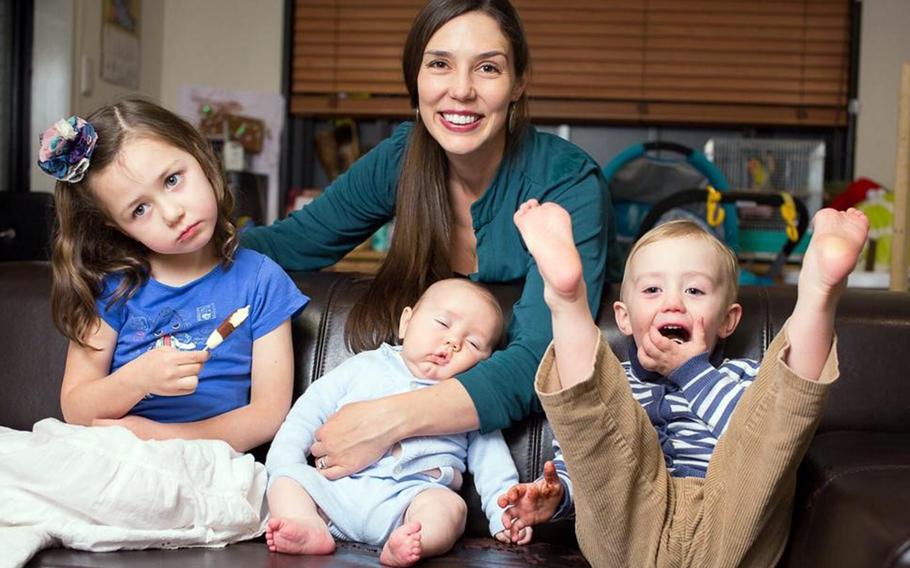
Janica Sims poses with her three children in this undated family photo. (Janica Sims)
A state judge in Colorado has recognized a Japanese ruling that denies an American parent access to her minor children, a decision that advocates say sets a dangerous precedent for U.S. service members.
Fourth District Judge Erin Sokol’s decision in Colorado Springs caps a nearly two-year saga that began in a Japanese family court in Tokyo, where Janica Sims lost custody of her children to her Australian ex-husband, a permanent resident of Japan.
On Aug. 27, Sokol denied an emergency motion by Sims, a U.S. citizen, to stay a state magistrate’s order granting her ex-husband custody of their two sons.
The ruling set the stage for the return of Sims’ children to Japan and the loss of her parental rights, Sims told Stars and Stripes in a series of recent phone interviews.
The state magistrate had accepted Japanese jurisdiction in a custody case involving Sims’ two children, both American citizens living in the United States.
Foreign custody orders are treated like claims from another U.S. state, though they are brought to court with much less frequency, Kathryn Liss, executive director of DePaul University’s Schiller DuCanto and Fleck Family Law Center, said by phone Sept. 29.
‘Blatant violation’
John Gomez, chairman of the Japan-based advocacy organization Kizuna Child-Parent Reunion, believes the ruling violates U.S. and international laws and treaties and could lead to U.S. service members losing custody of their children to their foreign former partners, he said by phone Aug. 29.
“Back in [Washington] D.C., they need to know about this, because the [Judge Advocate Generals] are going to have to educate the service members,” he said, calling the ruling a “blatant violation” of children’s rights and family law.
“This is a very dangerous precedent to set,” he said. “It shouldn’t get that far; this needs to be nipped in the bud.”
Prior to 2014, when it ratified the Hague Convention on the Civil Aspects of International Child Abduction, Japan was known for protecting its citizens who kidnapped their own children from foreign spouses.
But hundreds of pre-convention parents are still fighting for access.
Japanese civil code states that divorcing parents must determine who will retain parental authority because harm may befall the child if the parents fail to agree. This effectually allows one parent to deny access to another, activists and family attorneys say.
A three-judge panel in Tokyo District Court upheld Japan’s custody law on June 22 after a challenge from 12 disaffected parents, according to a ruling summary on the court’s website.
Sole custody
Janica Sims’ custody fight began in April 2021 when her husband, David Sims, started divorce proceedings after mediation failed, according to court documents in Colorado. Janica Sims wanted joint custody of the children.
Tokyo Family Court awarded David Sims sole custody in March 2022, according to Sokol’s Aug. 27 order. An attorney for David Sims, Lorna Horton of Feingold Horton in Colorado, did not respond to calls and emails seeking comment.
Janica Sims said the Japanese court ruled without notifying her of the hearing while she was in Colorado. Court records state she “appeared to drop out of participating” once she learned of Japan’s sole-custody system.
A month later, David Sims petitioned Sherri Gryboski, the magistrate in El Paso County, Colo., to register the foreign custody order.
With the Sims’ boys living in Colorado, the Tokyo Family Court in January appeared to admit it lacked jurisdiction over the case when it declined to hear Janica Sims’ motions, her Tokyo attorney, Tomohito Sasaki, said by phone Sept. 1.
On Feb. 9, Gryboski granted David Sims’ petition and upheld the Japanese custody decision.
But she also ruled that Colorado courts now have jurisdiction over any modifications and Janica Sims’ “parenting time” and “decision-making authority” had to be addressed.
Colorado law allows judges to strike down foreign custody claims that “violate the basic principles of human rights and fundamental freedoms.”
Sokol upheld the magistrate’s decision and ordered Janica Sims to hand over the boys’ passports without review.
Sokol also found that Janica Sims had not appealed Gryboski’s ruling. Sims said her former attorney failed to appeal the magistrates’ order and she has since retained new counsel and filed multiple unsuccessful challenges.
‘Far-reaching effects’
The U.N. Convention on the Rights of the Child, of which Japan is a signatory, states parents shouldn’t be separated from their children unless it is determined to be in their best interest after judicial review.
Under U.S. law, all parents are entitled to visitation or parenting time unless it is deemed harmful, Jeff Atkinson, a former adjunct instructor at DePaul University College of Law Chicago, wrote in an article for the U.S. Embassy in Japan website.
The implications of the Sims case are “alarming,” according to Mirjana Sujic Stamenic, a Serbian asylum lawyer working on the case with the U.N. High Commissioner for Refugees.
“Registering foreign custody decisions without a thorough review, especially involving cases where American citizens are affected, raises concerns about the proper protection of human rights, the best interests of children and the principles of due process,” she said by email Aug. 30.
The decision could have “far-reaching effects” for other Americans and military families stationed in foreign countries, she added.
Janica Sims has thus far declined to comply with the judge’s order; her children could be seized at any moment.
“I don’t know what we’re going to do next, but it could be asylum until the decree is vacated,” she said. “Our own country is persecuting us.”
Stars and Stripes reporter Hana Kusumoto contributed to this report.